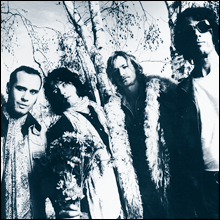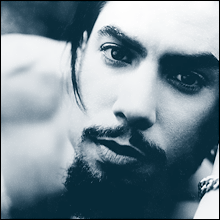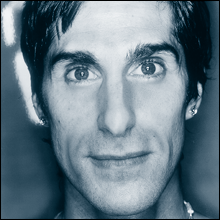![[Sidebar]](/standard/image/sidebar.gif)
![[Music Reviews]](/standard/image/headers/music_reviews_header.gif)
| clubs by night | club directory | bands in town | concerts | hot links | reviews & features |
Under the influence
Dave Navarro and Stone Temple Pilots come clean; plus Perry Farrell
by Matt Ashare
Stone Temple Pilots
In veteran music critic Nick Kent's preface to his The Dark Stuff: Selected Writings on Rock Music, 1972-1995 (Da Capo), the once drug-addicted writer offers a lucid excuse for what continues to be one of rock's more tired yet compelling behind-the-music clichés. "Some people will tell you The Dark Stuff is about rock stars taking too many drugs. They're wrong. It's all about character -- more specifically, the breed of person who gets marked out to play the big, bad, mad, and dangerous-to-know `rock 'n' roll star' in his day-to-day life . . . but it's also about the triumvirate of ego, drug abuse, and self-absorption that preys so relentlessly on the creative mind. Time and again, you'll find gifted individuals tormenting themselves with the question `Am I really good at what I do or am I just lucky?' "Many of the characters chronicled in The Dark Stuff -- from Pink Floyd's proverbial lost soul, Syd Barrett, to punk-rock wild child Iggy Pop to grunge martyr Kurt Cobain -- do fit the mold of rock-and-roll casualties (or survivors) whose talents were as much a curse as a blessing. There are others -- Sex Pistol recruit Sid Vicious -- who may have just been lucky in an unlucky way. But regardless of how many times it's told, the story of the celebrity antihero's descent into the drug-addled depths of living hell remains one of the most alluring and grotesquely seductive narrative archetypes in our reality-programmed culture.
The '90s rock scene was littered with high-life casualties, from landmark artists like Cobain to less crucial bit players like Blind Melon singer Shannon Hoon. Pearl Jam emerged from the ashes of Mother Love Bone singer Andrew Wood's overdose; the Red Hot Chili Peppers scored their biggest multi-format hit -- "Under the Bridge" -- with a wistful little number about frontman Anthony Kiedis's drug daze. And Alice in Chains were on the verge of making a career out of singer Layne Staley's seasons in heroin hell -- a career the band could still salvage if he ever decides to return from his self-imposed exile. In place of these casualties we've been treated to an uneven parade of sludge-factory hard-rockers with shamelessly junkie-inspired names like Godsmack, Mudvayne, and Rehab. So it should come as little surprise that a decade after alterna-rock's noisy and chaotic emergence as a commercial force, survivor stories have started popping up, in places like VH1's Behind the Music, where the Chili Peppers recently recounted their dalliances with the devil, and on discs like former Chili Pepper/current Jane's Addiction guitarist Dave Navarro's solo debut, Trust No One (Capitol), and Stone Temple Pilots' latest comeback attempt, Shangri-LA DEE DA (Atlantic).
Unlike STP singer Scott Weiland, whose relatively high profile as the frontman of an immensely popular band coupled with a nasty habit of letting his habit get him in trouble with the law made his difficulties front-page news a while ago, Navarro had the luxury of playing second fiddle to the more flamboyant screw-ups Perry Farrell (who also has a new solo album, Song Yet To Be Sung) and Anthony Kiedis. So though it may not be a huge revelation that he's no stranger to the dark stuff, the gritty and depressing details of his experiences have just begun to surface with the release of Trust No One. The disc itself isn't all that explicit. True, the soul-searching first single is called "Rexall," and it features plenty of read-between-the-lines lyrics like "I hate my life" and "I've had enough of feeling sick/The sugar never helps." And there's an unexceptional cover of the Velvet Underground's seedy "Venus in Furs" ("Heroin" would have been too obvious, and Bowie did "White Light/White Heat").
Dave Navarro
But Trust No One is only half the story -- maybe not even that. The real dark stuff is in the pages of Don't Try This at Home: A Year in the Life of Dave Navarro. This biography of sorts penned by Navarro and New York Times critic Neil Strauss documents in vivid detail Navarro's relapse into heroin and cocaine addiction between June of 1998 and June of 1999. The original pub date was to coincide with the release of Trust No One, but Navarro has opted to make a few changes in the candid text, and currently Regan Books/HarperCollins is looking at an August date. In the meantime, there is a disturbing little teaser of an excerpt in the July issue of Spin that should get the old voyeuristic juices flowing.The release of Trust No One, on the other hand, falls nicely between a well-received Jane's reunion show at the Coachella Valley Music and Arts Festival (in Indio, California) on April 28 and Farrell's reconvening of the band for a national tour that's scheduled to begin in August. But the disc itself is being marketed as Navarro's arrival as a complete artist -- a distinguished lead-guitarist who can also step up to bat as a probing singer/songwriter. The Capitol press bio raves, "Navarro's first solo project is not the guitar-hero album that fans may have expected." Writing in the latest issue of Rolling Stone, James Hunter reiterates (perhaps unintentionally) that sales pitch: "This authoritative debut from the former [sic] Jane's Addiction and Red Hot Chili Peppers guitarist is not the kind of album where a tuneless guitar technician runs wild with the soloing . . . "
Which is largely true. Trust No One is about tone and texture more than flashy fretwork, and the moods are heavier than the metal. In fact, the Pro-Tooled mix of throbbing sequencers, industrial guitar noises, programmed rhythm tracks, and processed power chords that underlies the acoustic guitars and drums brings to mind a less severe version of the claustrophobic world Trent Reznor mastered on The Downward Spiral. Navarro even holds his own as a somber, mysterious singer, though lyrics like "There is no love left in your eyes/There is love between your thighs/Roll over say goodnight" make it hard to take him too seriously.
Perry Farrell
AT THIS POINT it's difficult to believe that Weiland himself can get artistic mileage out of his long, hard journey into heroin hell without cracking a sly smile. His first recovery record was supposed to be the very Bowie-sounding 1998 solo joint 12 Bar Blues (Atlantic), but he got busted dope-shopping in Alphabet City shortly after its release. Then, having endured a poor showing minus Weiland, the STP boys accepted their prodigal singer back on 1999's No. 4, but his run-ins with the law kept them off the road. So even though the songs remain very much the same on Shangri-LA DEE DA (especially when guitarist Dean DeLeo indulges in a little cagy Pagey soloing on the dreamy tangeriny "Wonderful"), it's clear that drugs are a wellspring of inspiration that hasn't yet run dry for Weiland.There's enough marginally veiled post-addiction introspection wending its way through this new crop of tunes to satisfy all but the most demanding voyeur. "Couldn't find a way to live through the pain," Weiland growls passionately in "Dumb Love," which kicks things off by making a few minor downtuned concessions in the direction of rage-rocking new metal. And in the amusingly titled, gently slamming psychedelic excursion "Bi-Polar Bear," our hero finds that he's left his "meds on the sink today." But the woe-is-me angst on Shangri-LA DEE DA doesn't seem half as gratuitous as it did back on Core, when the mercurial Weiland was copping heavily from Cobain. And there's actually a lot less of it. The best tracks here are the lighter, more playful numbers, like the power-poppy "Days of the Week" and the Bowie-ish glam-rocker "Hollywood Bitch." And then there's "Too Cool Queenie," an almost Beatlesque (by way of ELO) pop-rocker that, if I'm not mistaken, could be retitled "The Ballad of Kurt and Courtney." Either way, it seems Weiland has finally reached a point where he can ask himself that question -- whether he's good at what he does or just lucky -- without having to fear the answer.
IT'S ALWAYS BEEN CLEAR that Perry Farrell is a guy who's good at what he does. But in recent years, as he's gotten farther and farther away from Jane's Addiction's art-metal circus, it's grown harder and harder to tell whether what he does is any good. And Song Yet To Be Sung isn't going to help in that regard. Song Yet To Be Written might have been a better title, since most of the disc comes off as a vain attempt to fuse trancy grooves, drum 'n' bass breakbeats, exotic Eastern melodicism, and the occasional touches of rockist guitar into some kind of new-age one-world music experience dripping with neo-hippie good vibes.
There are times when it seems Farrell's onto something promising -- the title track, for example, hits some nifty spiritual peaks that bring to mind Peter Gabriel's more ambient pop excursions ("Red Rain," for one). And then there are times when you just have to wonder what he's on, as when he warbles "Shake your mother hips for me/Outside heaven drizzles/Grow us up a field of apples" in the nearly formless "Shekina." Let's just say it's not a bad thing that both he and Navarro will have a catalogue of Jane's Addiction favorites to fall back on when they tour together later this summer.
| home page | what's new | search | about the phoenix | feedback |
Copyright © 2000 The Phoenix Media/Communications Group. All rights reserved.


